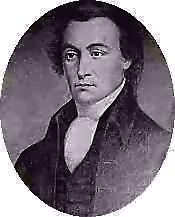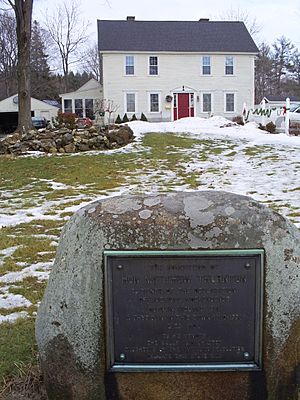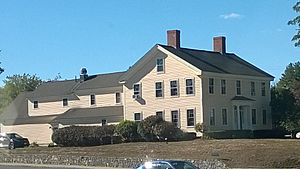Matthew Thornton facts for kids
Quick facts for kids
Matthew Thornton
|
|
|---|---|
 |
|
| Born | March 3, 1714 |
| Died | June 24, 1803 (aged 89) |
| Resting place | Thornton Cemetery, Merrimack, New Hampshire |
| Known for | Signer of the United States Declaration of Independence |
| Signature | |
Matthew Thornton (born March 3, 1714 – died June 24, 1803) was an important Founding Father of the United States. He was born in Ireland and later signed the United States Declaration of Independence. He represented the state of New Hampshire when he signed this very important document.
Contents
Who Was Matthew Thornton?
Matthew Thornton was born in Ireland in 1714. His parents were James and Elizabeth Thornton. His family was Scotch-Irish, meaning they were Scottish people who had settled in Ireland. Matthew was likely born near Derry, a city in Ireland.
Moving to America
When Matthew was three years old, in 1716, his family moved to North America. They first settled in Wiscasset, Maine. In 1722, their community was attacked by Native Americans. Matthew's family had to leave their burning home. Soon after, they moved to Worcester, Massachusetts.
A Doctor and Leader
Matthew Thornton studied medicine in Leicester. He became a doctor, also called a physician. He started his medical practice in Londonderry, New Hampshire. In 1745, he worked as a surgeon for the New Hampshire Militia troops. They were on an expedition against Fortress Louisbourg.
Thornton also became involved in politics. From 1758 to 1762, he served in the New Hampshire Provincial Assembly. This was like a local government group. He was also a justice of the peace, which meant he could help with legal matters. From 1775 until 1779, he was a colonel in the militia, which is a group of citizen soldiers.
In 1760, Matthew Thornton married Hannah Jack. They had five children together. Thornton became a selectman in Londonderry, helping to run the town. He was also a representative and president of the Provincial Assembly. He was part of the Committee of Safety. This group helped create New Hampshire's first state constitution. This was the first state constitution made after the American Revolution began.
Joining the Continental Congress
In 1775, Thornton was the president of the New Hampshire Provincial Congress. From January to September 1776, he was the speaker of the New Hampshire House of Representatives. He was chosen to join the Continental Congress. This was the group of leaders from the American colonies.
The debates about independence had already happened when he was elected. He arrived in Philadelphia in November 1776. This was four months after the Declaration of Independence was formally signed. But he was still allowed to sign the document.
Life After the Revolution
After the Revolution, Matthew Thornton became a writer of political essays. He stopped working as a doctor. In 1780, he moved to Merrimack, New Hampshire. There, he became a farmer and ran Thornton's ferry with his family. Even though he didn't go to law school, he served as a judge. He was a judge on the New Hampshire Superior Court from 1776 to 1782.
In 1783, Thornton represented Merrimack and Bedford in the New Hampshire House of Representatives. Then, from 1784 to 1787, he represented Hillsborough County in the New Hampshire Senate. At the same time, he was a state counselor from 1785 to 1786. He also served as a state representative for Merrimack again in 1786. His wife, Hannah, passed away in 1786.
His Lasting Legacy
Matthew Thornton died in Newburyport, Massachusetts, while visiting his daughter. He was 90 years old. He is buried in Thornton Cemetery in Merrimack. His grave marker, called a cenotaph, says "The Honest Man."
The town of Thornton, New Hampshire, is named after him. An elementary school in Londonderry and Thorntons Ferry School in Merrimack are also named in his honor. Thornton's home in Derry is listed on the National Register of Historic Places. This means it's an important historical site. There is also a New Hampshire historical marker (number 79) about him in Merrimack.
Matthew Thornton had a nephew, also named Matthew Thornton. This nephew was accused of not being loyal to the American cause during the Battle of Bennington in 1777. Ebenezer Webster, the father of famous speaker Daniel Webster, investigated the accusation. At his trial, Captain Thornton said he was not guilty. After hearing evidence, the jury found him not guilty, and he was set free.
See also
 In Spanish: Matthew Thornton para niños
In Spanish: Matthew Thornton para niños



